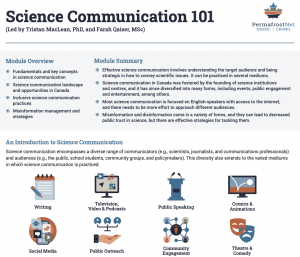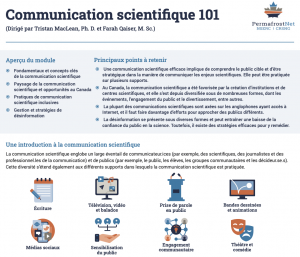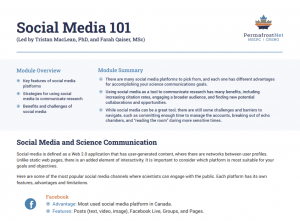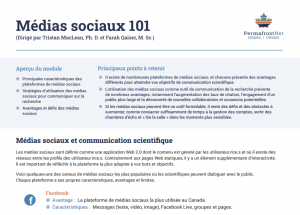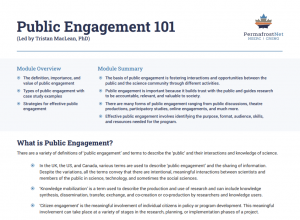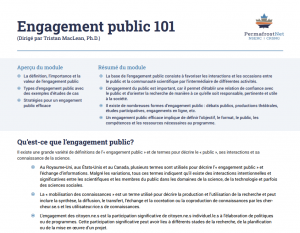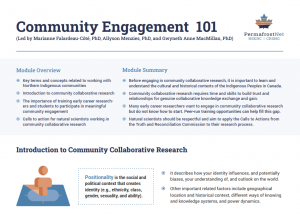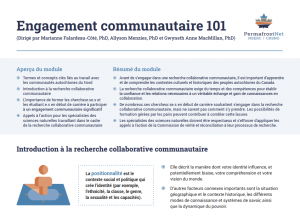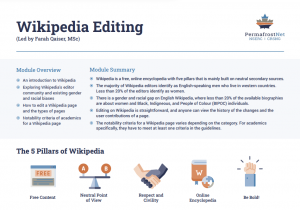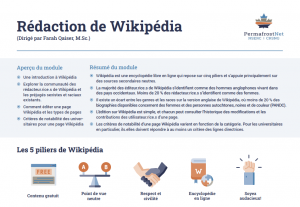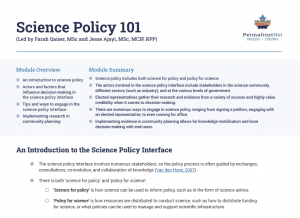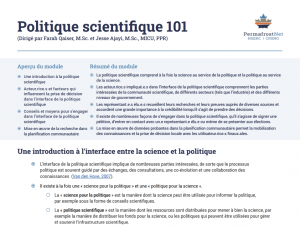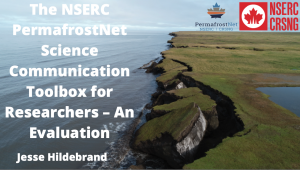Ressources
Missed the workshops or want to recap the key content? You can now watch recordings of the workshops and download handouts that summarize each workshop.
Handouts
- Science Communication 101 – en anglais – français
- Social Media 101 – en anglais – français
- Public Engagement 101 – en anglais – français
- Community Engagement 101 – en anglais – français
- Wikipedia Editing – en anglais – français
- Science Policy 101 – en anglais – français
Workshop recordings
External Program Evaluation
The course was formatively evaluated by the course designers Farah Qaiser, Alana Wilcox and Tristan Maclean. The overall program was also independently evaluated by Jesse Hildebrand, using qualitative assessments of the preparatory work done by the program coordinator team, pre-course surveys, in-workshop polls, and summative interviews with course attendees.
Who was this course for?
The Science Communication Toolbox for Researchers was provided to NSERC PermafrostNet researchers, including trainees.
What was the aim of this course?
The program provided evidence-based science communication tools and training to help you effectively share knowledge, communicate your research and convey information about the broader issues posed by permafrost to a variety of non-expert audiences, including policy makers. These workshops enhance your skills in science communication for research, community engagement, and science policy.
When was it?
The workshops were delivered primarily on Zoom during the network’s weekly Open Forum sessions at 2:30pm-4/4:30pm Eastern Time. The workshops were scheduled for 13 and 20 January, 3 and 17 February, 3, 17 and 31 March 2021.
January 13 – Science Communication 101
January 20 – Social Media 101
February 3 – Public Engagement 101
February 17 – Visual Science Communication
March 3 – Community Engagement 101
March 17 – Wikipedia Editing
March 31 – Science Policy 101
The meeting link and password for the workshops can be found in our members area.
Session descriptions
The program consists of seven online workshops that use synchronous and experiential learning approaches. Each workshop will last for 2-2.5 hours, with minimal pre-workshop activities that should take up to an hour at most.
January 13 – Science Communication 101
Learn about science communication in Canada, fundamentals and key concepts in science communication, and learn how to manage and effectively address misinformation.
January 20 – Social Media 101
Learn the key features of social media communications, when and how to use social media to communicate about research and evidence-based best practices in increasing the effectiveness and reach of your social media communications.
February 3 – Public Engagement 101
Learn what public engagement is and how it differs from other forms of science communication. Learn about the many opportunities for engaging online and ways to make your online public engagement effective.
February 17 – Visual Science Communication (Guest instructor)
Learn the essentials behind using infographics, and develop a visual tool to aid in effectively communicating your research and sharing knowledge to a variety of stakeholders.
March 3 – Community Engagement 101 (Guest instructors)
Build a better understanding of the benefits and challenges associated when engaging with remote and Northern communities in this interactive workshop.
March 17 – Wikipedia Editing
Learn how to create, develop and edit Wikipedia pages on permafrost-related topics, according to your expertise, and address biases and equity, diversity and inclusion issues in STEM by creating pages about under-represented or over-looked knowledge holders.
March 31 – Science Policy 101
Learn about the Canadian science policy landscape and discover how science can contribute to the decision-making process. You will explore different policy communication tools, including op-eds and policy briefs, and practice translating your research and expert opinion into a short briefing note to help inform decision-making.
Who delivered this course?

Farah Qaiser
Researcher and Science CommunicatorExperience: Science policy, science communication, science writing, social media, wikipedia editing, public speaking, outreach. Co-Founder & Past President, Toronto Science Policy Network; Member, Chief Science Advisor’s Youth Council; Co-Organizer; ComSciConCAN.
Qualifications: Molecular Biology BSc (University of Toronto), Genomics MSc (University of Toronto).

Alana Wilcox
Wildlife Health Specialist, Wildlife Health Division, Environment and Climate Change CanadaExperience: Community engagement, knowledge mobilization and knowledge weaving, conservation policy, science communication, science writing, outreach, museums and heritage interpretation.
Qualifications: Religious Studies BA Hons (University of Winnipeg); Biology BSc Hons (University of Winnipeg); BioScience, Technology & Public Policy MSc (University of Winnipeg); Integrative Biology PhD (University of Guelph); Fellow of the Jackson Wild Media Lab in Science and Wildlife Filmmaking

Tristan MacLean
Carleton University, NSERC PermafrostNetExperience: Public engagement, science communication training, formal and informal science learning, outreach, events, online science communication, citizen science, science theatre, museums and evaluation.
Qualifications: Experimental Pathology BSc (University of St. Andrews), Clinical Pharmacology MSc (University of Aberdeen), Biochemistry PhD (University of Edinburgh) and Science Education PGCE (Durham University).

Julia Krolik
Founder, Pixels and Plans | Art the ScienceExperience: Information design, data visualization, public speaking, communication strategy, science communication, knowledge mobilization, workshop design, creative direction, sciart, art exhibitions, entrepreneurship, nonprofits, research.
Qualifications: 10,000 hours in Art Exhibition & Graphic Design, Mathematics & Biology BSc Hons (University of Guelph), Biotechnology Advanced Diploma (St Lawrence College), Pathology & Molecular Medicine MSc (Queen’s University) .

Marianne Falardeau-Côté
Postdoctoral researcher, Littoral, Université LavalExperience: Arctic marine ecology, community and youth engagement, knowledge co-production, mobilization and dissemination, science communication, science writing.
Qualifications: BSc Biology (Université Laval); MSc Hons Marine Biology (Université Laval); PhD Natural Resource Sciences (McGill University).

Allyson Menzies
Research Associate, Wise Lab, Guelph UniversityExperience: Wildlife biology, northern research, community engagement, science communication, science writing, knowledge dissemination
Qualifications: BSc Hons Biopsychology (University of Winnipeg); Bioscience, Technology, and Public Policy MSc (University of Winnipeg); Higher Education Teaching Certificate (University of Winnipeg); PhD in Renewable Resources (McGill University).

Gwyneth Anne MacMillan
Postdoctoral Researcher, Department of Natural Resource Sciences, McGill University, CINE Centre for Indigenous Peoples’ Nutrition and EnvironmentExperience: Aquatic ecology, ecotoxicology, trace metals, mercury, community-collaborative research, science education, science outreach.
Qualifications: B.Sc. Biology and Anthropology (University of Western Ontario); Graduate Diploma (D.E.S.S.) in Environment and Sustainable Development: Biogeochemistry; Ph.D. in Biological Sciences, Faculty of Arts and Science, University of Montreal.
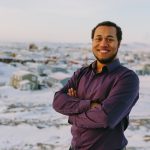
Jesse Ajayi
Senior Community Planner & Partner, Northern Futures PlanningExperience: Land-use planning, long-range policy, community engagement, professional development training.
Qualifications: MSc Planning (University of Toronto), MCIP, RPP.
Pre-program preparation
- Join our “Training” Teams channel for access to chats, files, links and background reading materials.
- Introduce yourself! Why are you interested in science communication, or have you taken part in science communication before?
- Share social media handles (if you have them and are comfortable doing so).
Evaluation
In addition to a summative evaluation that is administered by NSERC through a survey, we will carry out informal formative evaluation to improve each subsequent session to help us tailor the sessions to your needs. We have also commissioned an independent external evaluator to measure the success of the project and the achievement of outcomes and deliverables in more detail. We will use a variety of surveys, online tools and interviews to capture interactions and feedback that occur during and after training sessions.
Contact info
Tristan MacLean, Director of Operations, NSERC PermafrostNet, tristan.maclean@carleton.ca
Funding
This program is funded by the NSERC Science Communication Skills grant.

